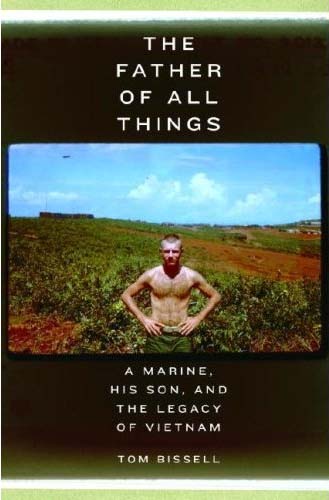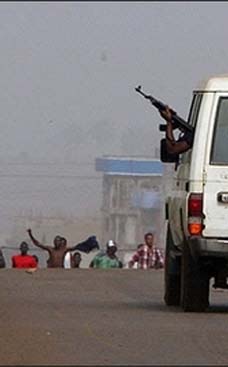
Their exchanges, in revealing the chasm between father and son, suggest how war creates two kinds of people: those who lived through it and those who will never understand what it was like to live through it. During the trip, Tom tries, time and again, to get his father to admit that the war isn't finished for him, and the more the father protests that he has come to terms with it, the more the gap between them seems to grow. When they visit the beach where his father first set foot in Vietnam, Bissell tries to get his father to talk. His father asks for a moment, staring at the ocean in confusion and recognition. "This was where the man I knew as my father was born," Bissell writes. "It was as though he were looking upon himself through a bloody veil of memory." Sons have always had to tell themselves a great many things about their fathers, those tall, whiskered, larger-than-life figures they aspire to be — and sometimes fear becoming. Perhaps no son ever fully reconciles himself to his father, for good or ill. Bissell's beautifully written book adds a chapter to the rich literature of familial struggle. Author Tom Bissell served as a Peace Corps Volunteer in Uzbekistan.
Paul McLeary reviews: Tom Bissell's "The Father of All Things
Tom Bissell's 'The Father of All Things'
Struggling to understand the legacy of the Vietnam War.
By Paul McLeary
The Father of All Things: A Marine, His Son, and the Legacy of Vietnam
Tom Bissell
Pantheon: 414 pp., $25
It's almost a cliché to say that Americans live under the long shadow of Vietnam. And our engagement in more wars since then, each with its own stories, lessons and tragedies, has only intensified our scratching at the nation's Vietnam wounds, refusing to let them fully heal.
The grip that war holds over discussions of Iraq and Afghanistan no doubt is due, in part, to the fact that most of the men who decided to wage the Persian Gulf, Afghanistan and Iraq wars — and the pundits and politicians who kick around their views in the opinion pages and on talk shows — came of age during the trauma produced by Vietnam.
But for those born in the 1970s, too young to have any experience with Vietnam save for its cultural fallout, the name has a set of associations different from those held by aging baby boomers, who knew a world, and an America, before the conflict. Journalist and fiction writer Tom Bissell, son of an unhappy Vietnam veteran, is one of those Gen-Xers.
Bissell grew up in a pop culture landscape stacked with ex-'Nam heroes like Chuck Norris' Col. James Braddock, Sylvester Stallone's Rambo and "The A-Team" — even Magnum, P.I., did two tours in Vietnam — whose struggles were defined by their service. The 1980s were full of people like these charismatic walking wounded, who, through a desire to make peace with their wartime experiences, affirmed America's ability to look forward while reliving its past.
For the postwar generation, Bissell writes in "The Father of All Things," "[t]his strange, lost war, simultaneously real and unimaginable, forced us to confront the past before we had any idea of what the past really was. The war made us think theoretically long before we had the vocabulary to do so. Despite its remoteness, the war's aftereffects were inescapably intimate. At every meal Vietnam sat down, invisibly, with our families."
Bissell's father, John, brought the war to the dinner table each night. Unlike those celluloid vets, he wasn't able to find catharsis by fighting his own redemptive, soundtrack-backed war. A Marine captain who had been wounded in combat, John Bissell left Southeast Asia in 1966, married and moved back to upper Michigan to raise two boys in his childhood home. He dealt with his war experiences by drowning in Johnny Walker and Budweiser, which soon led to divorce. The author remembers that on drinking binges, his father would wake him up to tell him stories about the war, which "used to scare the hell out of me." John admits, "I drank, and cried, and drank, and nothing worked."
To understand how and why his father eventually managed to tame his demons, Bissell takes him back to Vietnam — 40 years after he first arrived as a young Marine. Tom has dreamed up the trip to examine how his father's past has colored both their lives, because, as he notes, history is "the arrangement of memory ... an argument with the past." And father and son find a great many things to argue about, including the father's comical belief that his son is a communist and the son's inability to recognize that his father has made peace with the war, however fragile.
Their exchanges, in revealing the chasm between father and son, suggest how war creates two kinds of people: those who lived through it and those who will never understand what it was like to live through it. During the trip, Tom tries, time and again, to get his father to admit that the war isn't finished for him, and the more the father protests that he has come to terms with it, the more the gap between them seems to grow. When they visit the beach where his father first set foot in Vietnam, Bissell tries to get his father to talk. His father asks for a moment, staring at the ocean in confusion and recognition. "This was where the man I knew as my father was born," Bissell writes. "It was as though he were looking upon himself through a bloody veil of memory."
Bissell's strength isn't in writing history, as his extended digressions on the war, although well-researched, show. At times these historical flights seem forced — a way, one suspects, to compensate for a lack of narrative; but as the book goes on, they serve a crucial purpose, intended or not. It's important to remember that for the most part, textbooks and teachers rarely mention Vietnam. (Those of us who were in elementary and high school in the 1980s can attest to this.) The book, therefore, serves as an excellent thumbnail sketch of the major players and significant dates that define the conflict but have been ignored in popular retellings of the war. In this way, John Bissell's role in the great, impersonal sweep of history is placed in context.
As a travel writer, however, Tom Bissell is superb. His descriptions of today's Vietnam are breathtaking and deep, written with a novelist's flair for giving life to the inanimate and the obscure. On a visit to the city of Hue, where the Marines fought a deadly house-to-house campaign eclipsed only by the recent battle for Iraq's Fallouja, he writes: "The omnipresence of the Perfume River gave Hue's streets the busy maritime feeling of long, wide docks.... Large tourist 'dragon boats' painted a cheerfully ugly mixture of blue and yellow and green chugged down the Perfume's center, leaving a wake that looked as though the river were being unzipped."
Given the volume of history and the breadth of the travel writing, there are times when the book seems to pay insufficient attention to the father-son relationship. But their exchanges are always memorable. One comes when they visit the town of Son My, near where the My Lai massacre occurred. "I could have asked, and almost did: 'Did you ever do anything like that?' " Bissell writes. "But I did not ask, because no father should be lightly posed such a question by his son. Because no father should think, even for a moment, that his son believes him capable of such a thing. Because I knew my father was not capable of such a thing. So I was telling myself as we pulled up to Son My."
Sons have always had to tell themselves a great many things about their fathers, those tall, whiskered, larger-than-life figures they aspire to be — and sometimes fear becoming. Perhaps no son ever fully reconciles himself to his father, for good or ill. Bissell's beautifully written book adds a chapter to the rich literature of familial struggle.
In the end, the author finally seems to understand this as the two, just like other fathers and sons have done, become men living in the present, united by a shared past.
Paul McLeary is a writer and critic based in Brooklyn.
















